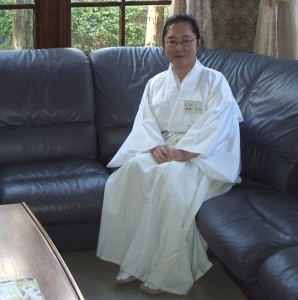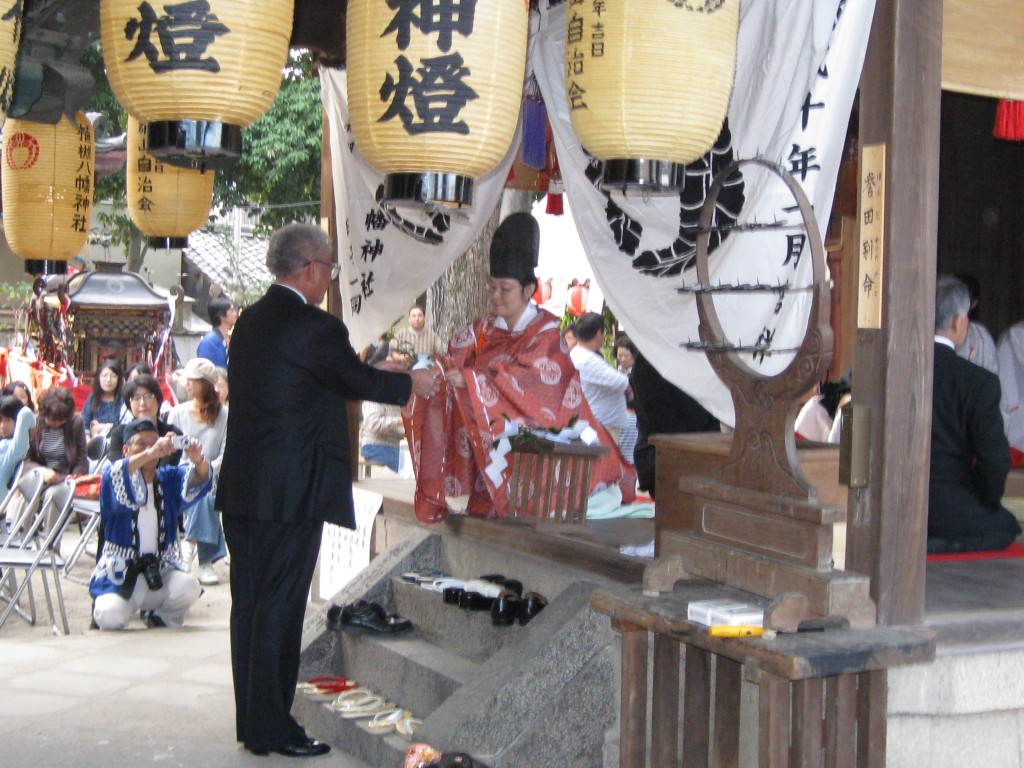Could you tell us about your shrine?
It’s in Koriyama in Nara Prefecture. It was founded more than 1,300 years ago for the protection of the old Nara capital. It’s mentioned in historical works, including Sei Shonagon’s Pillow Book.
How long have you been in charge?
About twelve years. I got the qualification to become a priestess about sixteen years ago, after studying on a one-year course at a college run by Atsuta Shrine in Nagoya.
It’s unusual for a female to be in charge of a shrine, isn’t it?
About 10% of priests are women, but these are nearly always the daughters or wives of shrine priests. What’s unusual in my case is that I had no family connections at all. In fact, I may be the first woman in Japan to become a head priest in this way. I was lucky because I found someone who was willing to back my application. In olden times, Shinto was led by female shamans, so it should not be unusual for women to act as priests.
What brought you to Shinto?
When I was a child, I worked as shrine attendant (miko) and learnt kagura dance. I’m very interested in Japanese history and literature, and Shinto is rooted in tradition. It’s the origin of the culture. That’s the point I enjoy most. I don’t enjoy such aspects as misogi (cold water austerity)!
What do you have to do as a priestess?
Well, it’s not a full-time posiition and I have a regular paid job. Each month I perform ceremonies just for the kamisama (gods). Then there are purificaiton ceremonies to protect cars and buildings; the blessings of babies a month after their birth; and the ceremonies of Shichi-go-san for the healthy development of children. Weddings used to be important for Shinto, but these days most couples prefer chapels.
How do you feel generally about your work?
It’s important for Japanese to keep up our traditions. There are 80,000 shrines in Japan, but a shortage of priests with only 20,000. Recently we resurrected a festival at our shrine, which I think was good for the community. This autumn we are going to reivive a festival based on gigaku (masked dance-drama) and are looking for volunteers to help with this. I also have a plan to establish a shrine in the UK, and am hoping to visit London later this year in connection with that.

Rika Saito handing out a tamagushi at the Uetsuki Hachiman main festival
************************************************************************************
For more information about the UK Shrine project, please click here. There is also a Facebook page, here.

Dear Rev Saito San
My wife is Japanese and would like to pray at a Shinto shrine in London, UK…Do you know if there are any Shinto shrines in London?
Thank you for your help
best regards
Darren
Unfortunately there are no Shinto shrines in London, though there’s certainly need for one.
Hallo
I wish to learn about Shinto religion
live in Greece
Hello ,
I am a 16 year old female that would like to become a Shinto although I myself am not Japanese. If you opened up a shrine in London , me and many other people would be very happy to support you and learn the traditional ways of a Shinto if possible.
Thank you very much Saito – San ,
Kimberley Bernard.
Hi, I’m a Wiccan and I notice several parallels between Wicca and Shinto. Wicca like Shinto does not have a dogma, Although it does have one rule, the Wiccan Rede, which states; ‘If it harms none, do what you will.’ Wicca is a nature based religion, as with Shinto, Wiccans revere nature and feel a connection with the land. Like Shinto Wicca is polytheistic, Most Wiccans believe in many Gods, headed by a God and a Goddess, like Izanami and Izanagi. Many Wiccans believe that places and objects have spirits, I can’t speak for all but many believe in Gods, Faeries, spirits of nature and spirits of the dead, in other words Kami. Wiccans don’t believe in the devil, that is a Christian belief. Like Shinto we believe in reincarnation, some believe we live seven or nine lives, others believe we live an indefinite number of lives. Like Shinto Wicca does not ban one from practising more than one religion.
I would love to see a Shinto Shrine in the UK, good luck and may the Kami bless you.
Many thanks for the comment, Dano, and I will pass the message on to the priestess. I agree with you about the commonalities of Wicca and Shinto, and in fact I’ll be writing about this soon in
my series on Pagan Pasts comparing the traditions of Britain and Japan…